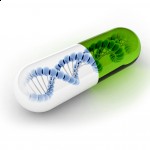 By Aine Fanning
By Aine Fanning
Nutritional therapists treating patients during their training at the College of Naturopathic Medicine are often asked by patients why some people can eat all around them and remain slim while others immediately gain weight. Could there be a fat gene which predisposes us to weight gain? If so does our DNA leave us destined to weight gain or can we do anything about it?
The Science
Scientists have found that there is a genetic component to weight gain and obesity which is expressed by abnormal lipid metabolism (that’s fat to you and me) which promotes abnormal weight gain, and the good news is that we can do a lot about it by changing our diet. We’ve focused on 3 of these tricky genes and looked at how you can make them work for you.
Gene No 1 – Leptin Gene
Leptin’s job is to regulate your appetite, and the level of circulating Leptin is directly proportional to the total amount of fat in your body. As you gain weight, your fat tissue makes more and more Leptin which is supposed to signal the brain to turn down your appetite, causing you to eat less; although some obese people can become resistant to Leptin. Equally, if you lose weight, your shrinking fat stores produce less and less Leptin, prompting hunger to return. This is fine when it is all in balance, but severe diets, like 1000kcal diets can lead to your Leptin levels severely dropping, causing your appetite to soar, and also reducing your fat burning ability, as Leptin plays a role in this as well. That is why crash diets never work in the long term!
To combat this, rather than counting calories, it is much easier to change the type of food you are eating to foods that are filling but not fattening.
Gene Tips:
· Fibre reduces appetite, it helps you eat less and feel fuller.
· Grains, legumes, fruit and vegetables are naturally so low in fat and calories that even when you eat until you are full, your calorie intake drops and you naturally lose weight-without lowering your Leptin!
· Low calorie diets reduce Leptin, so use the rule of 10 – include in your calorie intake each day at least 10kcal for every pound of your ideal weight.
Gene No 2 –LPL
Situated on chromosome 8 is the Lipoprotein Lipase (LPL) gene. It is responsible for coding the important fat-storing enzyme- LPL. LPL plays a vital role in how your body stores fat. Acting like a switch, LPL either sends fat to the muscle tissue, where it’s used for energy, or to the fat tissue, where it’s stored on the hips or abdomen.
It is possible to make fat from the other major parts of foods-carbohydrates and proteins but your body strongly prefers to build body fat from food fat. So if we limit the fat in our diets-LPL will be rendered idle!
Gene Tip
· Turn down the effects of your LPL gene by cutting down on animal fat in the diet and avoiding excess vegetable fat.
Gene No 3 – Insulin
Too much insulin in your blood stimulates LPL activity in your fat tissue – creating storage of fat – and paralyses LPL in your muscle tissue – preventing burning of fat.
Gene Tips
· Eating lots of Fibre and low fat vegetarian foods keep insulin in check.
· Avoid processed carbohydrates like white sugar, sugary drinks, processed cereals like cornflakes, etc. Switch to traditional oats and fruits instead.
· Also eat regular smaller meals-if your meal is small and comes fairly soon after the previous meal, your body takes it in stride. There is no huge rise in blood sugar and no violent insulin response to try to cope with the sudden influx of energy.
As powerful as genes are, they explain only about 30-40% of the difference in metabolism from one person to the next. As you can see, your metabolism depends more on diet and exercise than your genetic inheritance.
Gosia Desmond – Head of Research at The College of Naturopathic Medicine – will be speaking on ‘turning off your genes’ (including your cancer, diabetes and heart disease, as well as your ‘fat’ genes).
Dublin 30th Sep Cork 29th Sep
Venue Griffith College
South Circular Road
Dublin 8 Venue The Ambassador Hotel
St Luke’s Cross
Cork
Time 7pm – 9pm Time 6.30pm – 8.30pm
Fee €15 Fee €15
For bookings for the talk or information on our courses, call (01)2353094 or email dublininfo@naturopathy-ireland.com

![dna-tablet-150×150[1]](https://www.positivelife.ie/dev/wp-content/uploads/2009/12/dna-tablet-150x1501.jpg)
